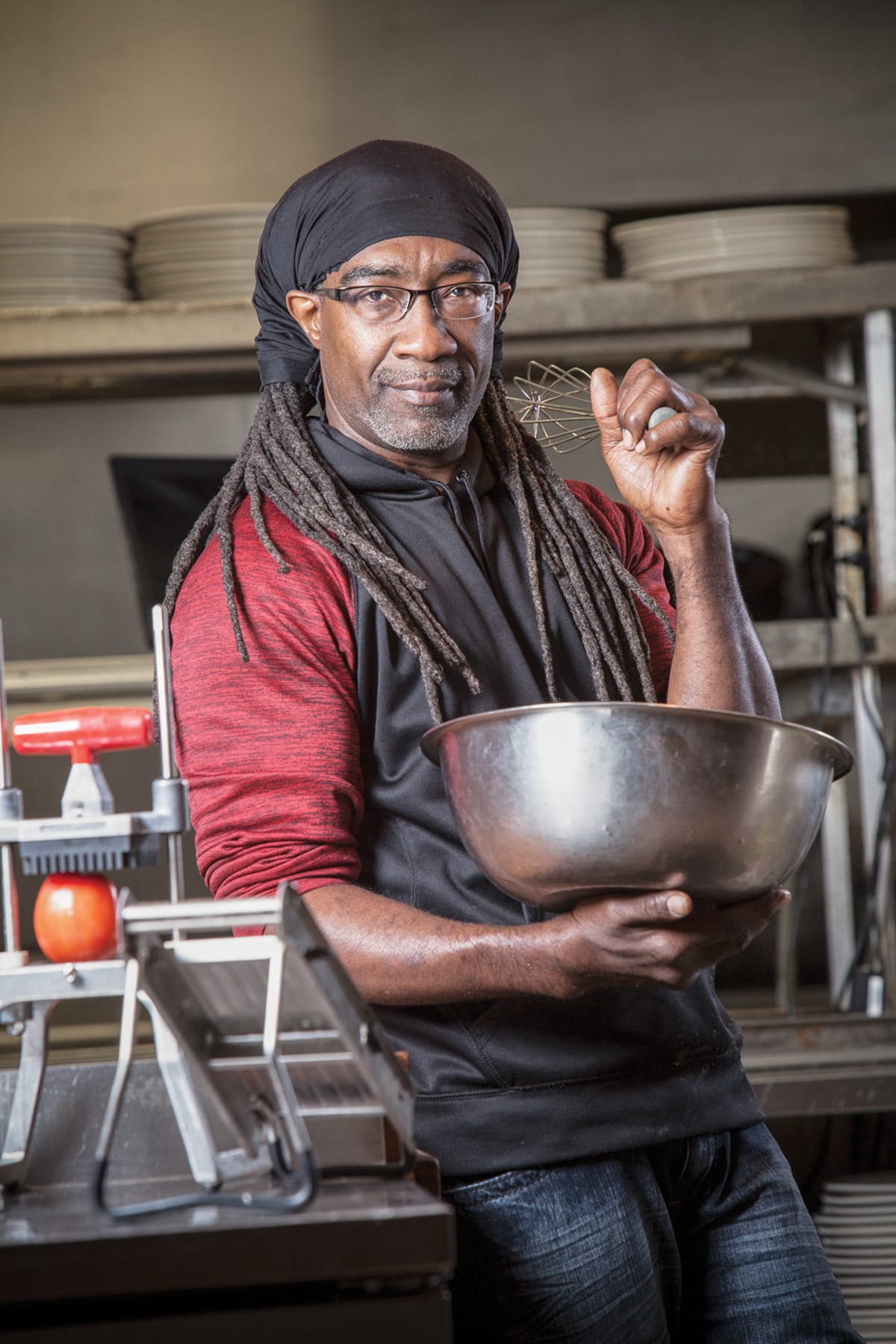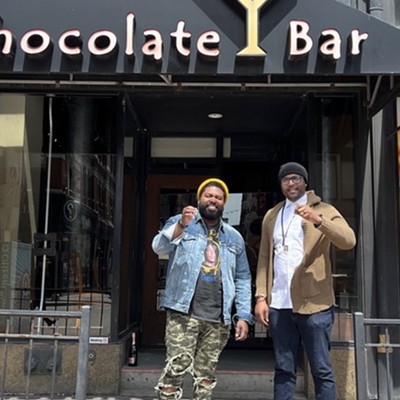Since launching Dinner in the Dark in 2010, Brian Okin and his partners have hosted monthly culinary events like clockwork. At each one, no fewer than six area chefs are invited to prepare a course for the crowd's enjoyment. Over the years, Okin estimates that more than 100 different names have graced those now-familiar multi-course menus. So, how many of those names belonged to people of color, I asked him.
"Probably 10 to 20," he responds.
It's not for a lack of trying, Okin promises. The appallingly low percentage of black sous chefs and chefs who have taken part in Dinner in the Dark is merely a symptom of a larger condition. And that condition is an industry-wide imbalance when it comes to the presence of black kitchen leaders.
"It's never been a focus one way or another, it's just who's available," Okin says. "If you asked me to name 12 black sous chefs or chefs in Cleveland, I couldn't do it."
If Brandon Chrostowski had his way, African Americans would be running restaurant kitchens at roughly the same percentage as they exist in the general population. Each year, he turns out another class of graduates over at Edwins Leadership & Restaurant Institute, a nonprofit that gives formerly incarcerated adults a solid foundation in the restaurant industry. Despite the fact that 95 percent of his charges land jobs after graduation, very few of them have risen to the upper echelons of the culinary profession.
"I would press you to walk in the back of a restaurant and see who's leading and see who's washing dishes," Chrostowski asserts. "Black and brown are at the sink, and maybe some guy who's prepping is of color, but the people on the line are white. The sous chef is white."
Chrostowski attributes some of the blame to long-standing stereotypes about black workers held by people in positions of power. When it comes time to move someone up in the ranks, the chef might subconsciously — or with malice aforethought — be thinking that the white cook is going to work harder and thus will make his or her life easier.
"It's a busy industry and people want to put individuals in spots where they feel like they won't have to work harder," Chrostowski theorizes. "An owner might think, 'I can plug this piece in here and things will work fine.' I think there's this perception that someone of color may not work as hard, or other generalizations which are preventing people from moving up."
These same biases, by the way, often get applied to Hispanic and female staffers.
Willy Jackson isn't one for excuses. As executive chef and kitchen operations manager for Zanzibar, Stonetown and Angie's Soul Cafe restaurants, he oversees a large, diverse crew of employees. But when he started in this profession 38 years ago, all he supervised was tub upon tub of dirty dishes.
"I was kicked out of high school and probably not headed down the right path," Jackson says. "My first boss changed my life. I've never seen an African American command that kind of respect from people like he did. He took me under his wing and my sights were immediately set on becoming a chef."
Over the years, Jackson has worked for demanding chefs like Zack Bruell and Sergio Abramof, and when he was hired on as kitchen manager at Cheesecake Factory, he was one of the only African American managers in the entire chain at that time. All along the way he's heard the same old stories about black folks getting passed over for a promotion at the hands of white bosses.
"I've joined kitchens where guys who have been there for eight, nine or 10 years would say to me, 'This company does not advance black people,'" he recalls. "I don't buy into that. You just have to work and let your work ethic stand on its own. It may not happen as quickly as you want it to, but nothing does."
Jackson would be the first to admit that his level of commitment and enthusiasm for the work is a rarity these days, and as an employer he's seen no shortage of lazy, undisciplined and unreliable employees regardless of skin color. But he thinks that part of the problem, as it applies to young African American people, is a lack of exposure to and excitement for food and dining.
"I think there's a lack of understanding about what this could mean as a career," Jackson explains. "Most African American kids aren't exposed to food diversity. Most are not in a position where their parents are going to be able to take them to Ruth's Chris. You're eating at home or McDonald's. That curiosity is not being stoked."
As a matchmaker, Chrostowski is always on the lookout for employers like Jackson, who will put in the time and effort necessary to train eager, but green, graduates of Edwins. Not every one of your cooks will possess the spark and drive required to forge a path to the top, but for those who do, that corridor should at least be free of obstacles.
"When someone hires somebody, they're still clay and they need to be molded," says Chrostowski. "We try and pair them up with people who will embrace them, no questions asked, and move them up."
One such pairing recently took place when Gregory Allen, a recent graduate of the Culinary Arts and Hospitality Program at Edwins, landed a job at Black Pig as a line cook. Working alongside chefs Mike Nowak and David Kocab, Allen currently is absorbing new skills like whole-animal butchery, charcuterie and fresh pasta production. He's in no hurry to leave, he says, because knowledge like this will only help him on his path.
"I'm going to stick around here until I learn more," he says. "I want to go all the way; I want to be chef de cuisine at a restaurant. If you don't love it, you won't go far with it. But if you have a passion for it, there's a lot of work out there for you."










